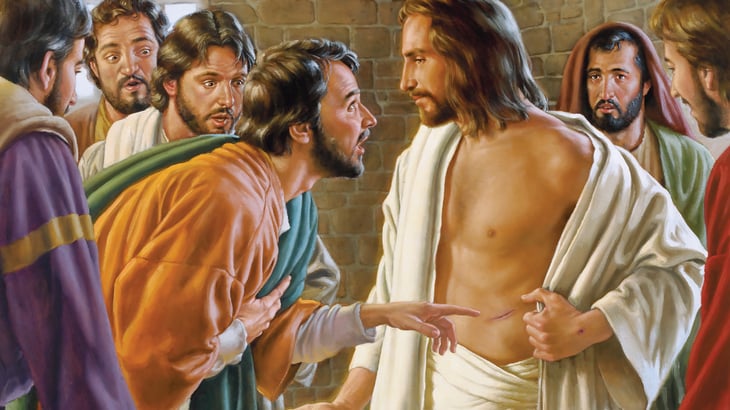Setting Up a Classroom Library Focused on Jesus
You may have asked yourself: Where do I begin when setting up a classroom library and how should I include books for Jesus time? Setting up a classroom library can be very costly and overwhelming. It’s important to think about each child’s possible interests and have a variety of books available for them. As a Lutheran educator, I find it especially important to have a large selection of books centered on Christ in our classroom library to help encourage students to gain a deeper understanding of who Jesus is and what He did for us.
Teaching the Twelve Apostles: Thomas
This month, we turn our attention to teaching about the apostle Thomas. We’ll begin with a few introductory verses followed by information from the Bible regarding this apostle, and finally, suggestions on how to present Thomas in the Sunday School setting.
Teaching Little Ones: About the Altar
Church services can sometimes be confusing for little ones. They will have questions about what they are seeing. Teaching young children about the individual parts of the church service can seem daunting. And it starts with learning yourself what it all means! It’s a great opportunity to help them grow and understand the symbols of our Christian faith. This is the second post in a series on teaching our youngest churchgoers about the parts of the service.
The Little Things are the Big Things
If you were to ask me what is most important to me, I would tell you things like my family, faith, and friends. You know. All the things that are supposed to be the most important. There are countless mugs, T-shirts, memes, and so on that jest about coffee being on that list. I always kind of roll my eyes at such things. And yet, if you were to observe my daily routines, you would see that I pretty consistently make an effort to ingest that caffeinated beverage nearly every day.
Teaching the Twelve Apostles: Judas Iscariot
This month’s blog will present perhaps the most challenging apostle of the Twelve, Judas Iscariot. I will begin with introductory key verses, followed by a few notes on the life of Judas, thoughts on teaching the tough topic of suicide, and, finally, list some teaching points.
Skeptical Thoughts and Teaching the Answers
I can see how people might be skeptical regarding Scripture. I was, after all. At one point, I truly didn’t know much about the Bible, so the minute someone stated that the Bible wasn’t reliable, it was all the evidence I needed to convince me that the Bible wasn’t true. I didn’t do any research for myself—I didn’t even read more into the claims. Nope. I was simply sure they were right. (Though this is not the case anymore.)
Teaching Kids About Pastor’s Vestments
Church services can sometimes be confusing for little ones. Why is it so quiet? Why does pastor wear that funny robe? Why do we say the same thing every week? Teaching young children about the individual parts of the church service can seem daunting. And it starts with learning yourself what it all means! This is the first of a series of posts on teaching our youngest churchgoers about the parts of service.
Teaching Children How to Pray
I will always remember the surprise and joy of listening to my brother’s first spontaneous prayer. In our family of six, my parents strove to lead nightly devotions and prayers. Though we didn’t get to it every night, it was enough that my brother, the youngest, was able to catch on to what we were doing. After a group prayer, the rest of us would take turns saying prayers out loud. In the middle of someone else’s petition, he suddenly burst out, “Thank You for the sandbox!” Then we knew it was time for Dalen to have a turn in our nightly prayers.
Leading a Classroom Devotion
Leading a classroom devotion—for any grade level—not only starts the school day on a positive note but also creates a sense of family and community within the classroom. Classroom devotions don’t need to take up much time, but being intentional about leading them begins the day in the best way: with Jesus.
Teaching the Twelve Apostles: Peter
Beginning this month, I am pleased to share a few thoughts regarding our Lord’s twelve apostles and to suggest some ideas on how to present these important biblical figures to Sunday School students. Each blog will include an introduction to an apostle, as well as one or two key points and some teaching suggestions. Given that this is the first blog, I will also include here a couple of ideas on how to help students remember all twelve disciples over the course of the year.























